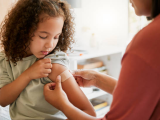Nov 17, 2006 (CIDRAP News) – For children and adolescents with asthma, the intranasal influenza vaccine FluMist was as safe as and more effective than an injectable vaccine in a phase 3 trial of young people aged 6 to about 17 years.
The study, which involved 2,229 children at 145 sites in 12 European countries and Israel, was published in the October issue of The Pediatric Infectious Disease Journal.
In the double-blind study, conducted during the 2002-03 flu season, children received either trivalent injectable inactivated influenza vaccine (TIV) or cold-adapted influenza vaccine, trivalent (CAIV-T). CAIV-T is an investigational refrigerated form of FluMist, designed to be easier to handle than the current version, which must be stored frozen. FluMist uses a live but weakened virus.
Currently, TIV is the only vaccine approved for use in high-risk children and adolescents, including those who have asthma. Young people with asthma are at increased risk for complications from respiratory infections and are more likely to be hospitalized when they have seasonal influenza. They are also more likely to experience asthma exacerbations after being sick with seasonal flu.
Few trials have examined the efficacy of TIV in children with asthma. One small safety study of FluMist in the same population suggested an increased risk of asthma attacks.
In the new study, for the strains of influenza that the vaccines were designed for, FluMist was 35% more effective than the injected vaccine (flu attack rates: CAIV-T, 4.1%; TIV, 6.2%). Against all influenza subtypes, CAIV-T was 31.9% more effective than TIV.
There were no significant differences between the two groups in the incidence of asthma exacerbations, mean peak expiratory flow rates, asthma symptom scores, or nighttime awakening scores. Slightly more patients who received CAIV-T reported runny nose or congestion (66.2% vs 52.5%), and about 70% of those who received TIV reported injection site reactions.
The authors of the study said their results are consistent with a similar study involving children aged 6 to 71 months who had a history of recurrent respiratory tract infections. "Although the reasons for higher observed relative efficacy for CAIV-T were not evaluated in these trials, induction of innate and specific mucosal immunity, as well as other factors, may play a role," they wrote.
Despite strong recommendations that high-risk children, including those with asthma, receive an annual flu shot, many children with asthma don't receive them, according to findings published in the September issue of Archives of Pediatric and Adolescent Medicine. Michigan researchers found that about 40% of children with asthma enrolled in the state's Medicaid program had at least one missed opportunity for vaccination in each of two consecutive flu seasons.
Kevin Dombkowski, DrPH, MD, coauthor of the study and research assistant professor in the Department of Pediatrics and Communicable Diseases at the University of Michigan Medical School, said only 17% were vaccinated in the first season and 22% the following season. "In all, fewer than 10% of these children were vaccinated both seasons. The national goal is for 60% or more of them to receive the flu vaccine every season," Dombkowski said in a university news release.
Earlier studies have shown that two major barriers to vaccinating high-risk children are physicians' failure to recommend the vaccine and parents' lack of knowledge about their child's risk of serious complications from the flu.
To increase vaccination rates, Dombkowski said interventions, such as reminder systems, are needed to improve physician and parent awareness about the importance of annual vaccinations for children with asthma.
Fleming DM, Crovari P, Wahn U, et al. Comparison of the efficacy and safety of live attenuated cold-adapted influenza vaccine, trivalent, with trivalent inactivated influenza virus vaccine in children and adolescents with asthma. Pediatr Infect Dis J 2006;25(10):860-9 [Abstract]
See also:
Dombkowski KJ, Davis MW, Cohn LM, et al. Effect of missed opportunities on influenza vaccination rates among children with asthma. Arch Pediatr Adolesc Med 2006;166(9):966-71 [Abstract]
Sep 11 University of Michigan news release on study of flu immunization rates in children with asthma
http://www.uofmhealth.org/news/912kids-with-asthma-and-flu-shots




















